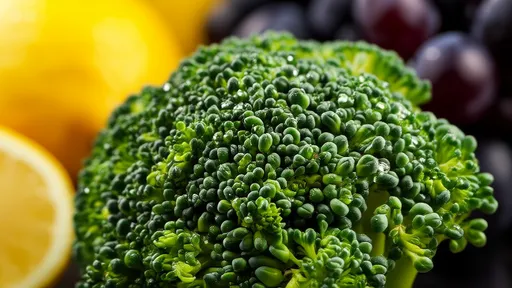The human gut is home to trillions of microorganisms, collectively known as the gut microbiota, which play a crucial role in maintaining overall health. Among their many functions, these microbes help digest food, produce essential vitamins, and even regulate the immune system. Recent research has highlighted the profound impact of diet on the composition and activity of these gut bacteria, with fermented foods emerging as a particularly powerful ally in promoting a healthy microbiome.
Fermented foods have been a staple in human diets for thousands of years, prized for their ability to preserve food and enhance flavor. But beyond their culinary appeal, these foods are now recognized as a key component of gut health. The fermentation process involves the breakdown of carbohydrates and other compounds by beneficial bacteria and yeasts, resulting in products rich in probiotics—live microorganisms that confer health benefits when consumed in adequate amounts.
Probiotics, the living microbes found in fermented foods, are like a direct delivery system for beneficial bacteria to the gut. When we consume foods like yogurt, kefir, sauerkraut, kimchi, and miso, we introduce strains of Lactobacillus, Bifidobacterium, and other friendly bacteria into our digestive tract. These microbes take up residence in the gut, where they compete with harmful bacteria for resources and space, effectively crowding out potential pathogens.
But the benefits of fermented foods extend far beyond simply adding more bacteria to the gut. The fermentation process also produces bioactive compounds, such as short-chain fatty acids (SCFAs), which serve as an energy source for the cells lining the colon. SCFAs like butyrate, acetate, and propionate have been shown to reduce inflammation, strengthen the gut barrier, and even modulate immune responses. This makes fermented foods not just a source of probiotics, but also a supplier of postbiotics—the beneficial byproducts of microbial fermentation.
The connection between fermented foods and immune function is particularly fascinating. Approximately 70% of the immune system resides in the gut-associated lymphoid tissue (GALT), which is in constant communication with the gut microbiota. The bacteria in fermented foods help train immune cells to distinguish between harmless substances and genuine threats, reducing the likelihood of inappropriate immune responses like allergies or autoimmune reactions.
Regular consumption of fermented foods has been associated with reduced markers of inflammation, improved antibody responses to vaccines, and even enhanced resistance to infections. Some studies suggest that the diverse array of microbes in traditionally fermented foods may help "exercise" the immune system, much like physical activity strengthens muscles. This microbial diversity appears particularly important in early life, with evidence suggesting that children who consume fermented foods may develop more robust immune systems.
Interestingly, the benefits of fermented foods may extend beyond the gut. The gut-brain axis—a bidirectional communication network between the gastrointestinal tract and the central nervous system—means that a healthy gut microbiome can influence mood, cognition, and stress responses. Some research indicates that the probiotics in fermented foods may help regulate neurotransmitters and reduce anxiety and depression symptoms, showcasing the far-reaching impact of these microbial powerhouses.
While all fermented foods offer benefits, some stand out as particularly potent. Traditional kimchi, for instance, contains multiple strains of lactic acid bacteria along with fiber-rich vegetables, creating a synergistic effect. Kefir, a fermented milk drink, hosts an exceptionally diverse microbial community. Even fermented teas like kombucha provide unique compounds that may support gut health, though they typically contain fewer live cultures than dairy or vegetable-based ferments.
It's important to note that not all products marketed as fermented contain live cultures. Many commercially available pickles, for example, are made with vinegar rather than traditional fermentation, while some yogurts are heat-treated after fermentation, killing the beneficial bacteria. To reap the full benefits, consumers should look for products labeled as containing "live and active cultures" or consider making fermented foods at home, where the microbial content can be carefully controlled.
The growing body of research on fermented foods and gut health has led to renewed interest in traditional food preparation methods. In an era of highly processed foods and widespread antibiotic use—which can decimate gut bacteria—fermented foods offer a natural way to restore microbial balance. As scientists continue to unravel the complex relationships between diet, microbiota, and health, these ancient foods are proving to be remarkably modern solutions to contemporary health challenges.
While fermented foods are generally safe for most people, those with compromised immune systems or certain digestive conditions should consult a healthcare provider before making significant dietary changes. For the majority of individuals, however, incorporating a variety of fermented foods into the diet represents a simple, delicious strategy for supporting gut health and, by extension, overall wellbeing.
As we deepen our understanding of the gut microbiome's role in health, the wisdom of traditional diets rich in fermented foods becomes increasingly apparent. These microbial-rich foods serve as a bridge between our ancient dietary heritage and cutting-edge nutritional science, offering a delicious way to nourish both ourselves and the trillions of microorganisms that call our bodies home.

By /Jul 1, 2025

By /Jul 1, 2025

By /Jul 1, 2025

By /Jun 18, 2025

By /Jun 12, 2025

By /Jun 12, 2025

By /Jun 12, 2025